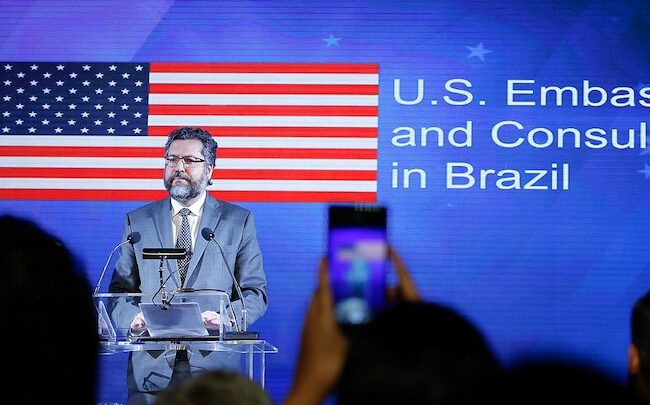Brazil thanks Trump for being “on the same page” in the Amazon controversy: no foreign interference
Brazil has enjoyed strong backing from Trump's government after outrage in Europe over evidence that logging, industry and fires have multiplied in the Amazon under Bolsonaro.

Brazil and the United States believe the international community should have no say in confronting fires raging in the Amazon rainforest, Brazilian Foreign Minister Ernesto Araujo said on Friday after meeting President Donald Trump.
“I think we’re on the same page, the governments are on the same page,” Araujo said at the White House, explaining that this means pushing back against what he described as interference in Brazil’s affairs by foreign governments concerned over the rainforest’s future.
Araujo was accompanied in the meeting with Trump by rightwing Brazilian President Jair Bolsonaro’s son Eduardo, who has been tapped to become ambassador to Washington.
Brazil has enjoyed strong backing from Trump’s government after outrage in Europe over evidence that logging, industry and fires have multiplied in the Amazon under Bolsonaro.
The foreign minister told reporters that the meeting with Trump lasted about 30 minutes and demonstrated “the special nature” of the US-Brazilian relationship under Bolsonaro.
Araujo said Trump agreed with Brasilia’s position that the rest of the world should keep out of Brazil’s affairs.
“He and President Bolsonaro, and both administrations, share this view that countries are sovereign in their territories,” he said.
He also said the importance of the Amazon rainforest as a unique factor in regulating the world’s already heating climate is exaggerated.
“We are conscious of how important the Amazon is for the world. But other forests are, other ecosystems are,” he said.
Latest data from Brazil’s Institute for Space Research showed a total of 87,257 this year, the highest since 2010 when 132,106 fires were detected across the country.
But Araujo minimized the importance of fires in the rainforest, saying they were “on average compared to last year.”





